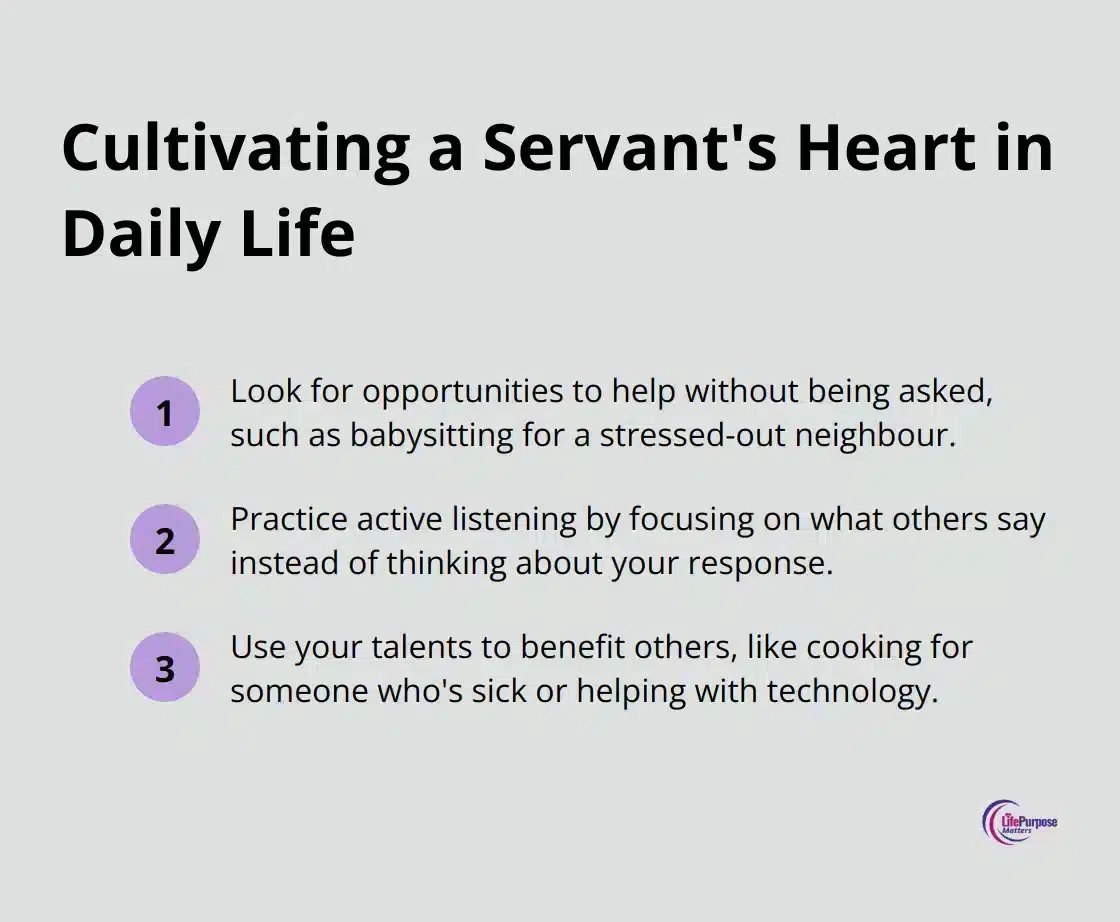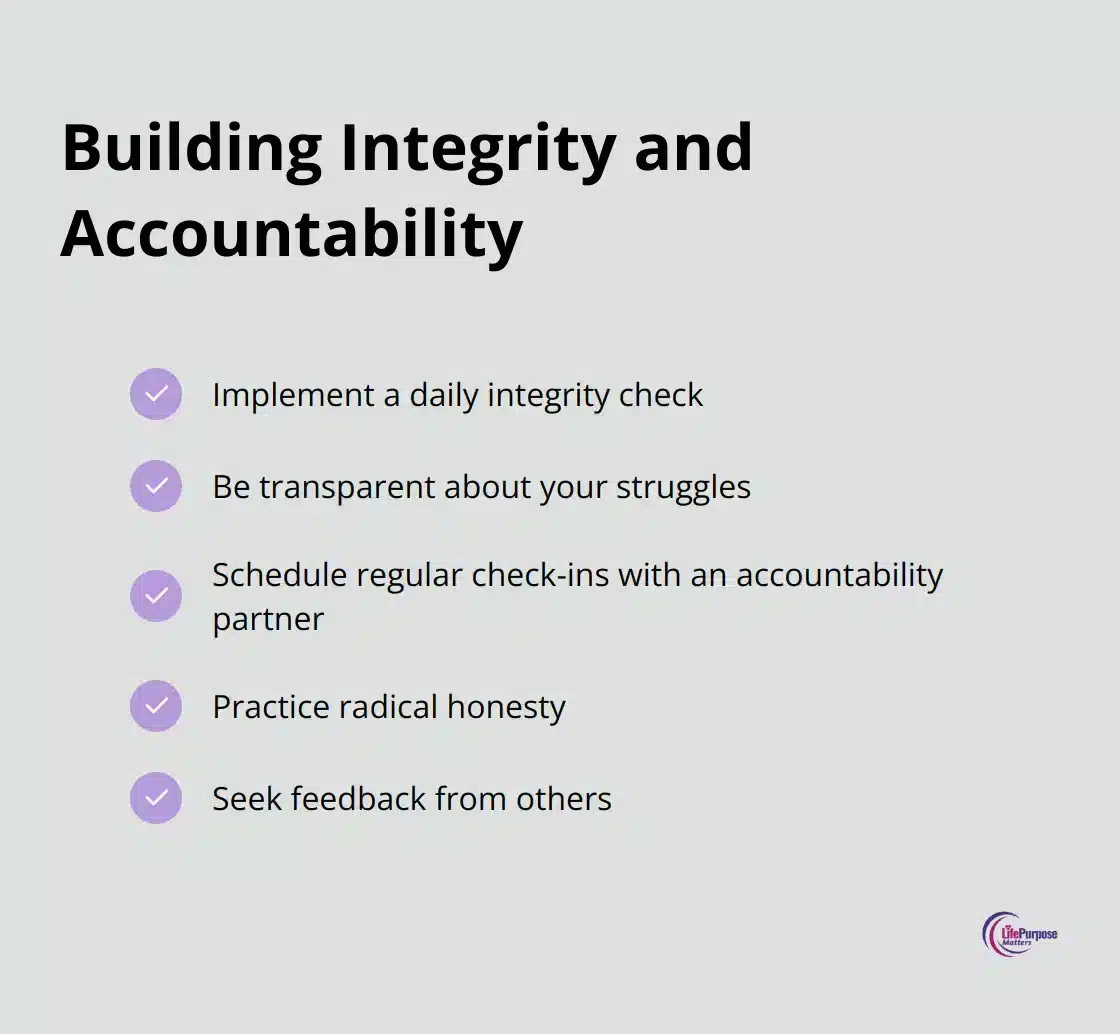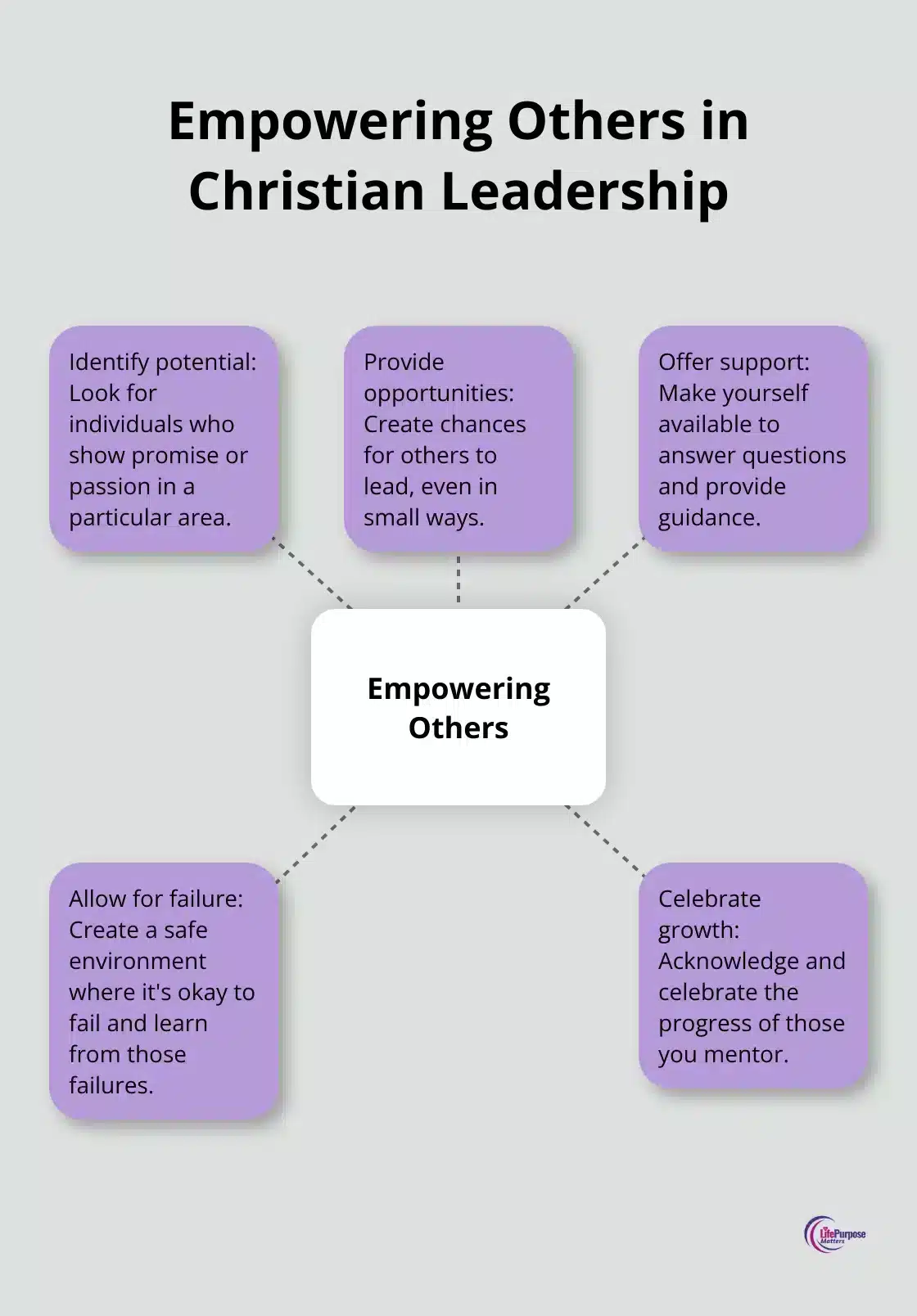At Life Purpose Matters, we believe that Christian leadership principles aren’t just for pastors or church elders. They’re for every believer. Leadership in Christianity isn’t about power or position. It’s about serving others, maintaining integrity, and empowering those around us.
Table of Contents
ToggleIn this post, we’ll explore how you can apply these principles in your daily life, regardless of your role or title.
How to Serve Like Jesus: The Essence of Christian Leadership
At Life Purpose Matters, we often discuss the importance of servant leadership in our Christian walk. But what does it mean to lead by serving? Let’s explore this transformative concept that Jesus himself modelled for us.
Servant leadership turns the traditional leadership model upside down; Instead of focussing on power and authority, it puts others first and meets their needs. Jesus demonstrated this when he washed his disciples’ feet – a task usually reserved for the lowest servants. This act was a precursor to His sacrificial love on the cross. (Can you imagine how shocking that must have been?)
The Heart of Servant Leadership
The core of servant leadership is love – genuine, selfless love for others. It doesn’t mean being a doormat or letting people walk all over you. It means choosing to serve because you value others and want to see them thrive.
Consider your daily interactions. How often do you put others’ needs before your own? It could be as simple as letting someone go ahead of you in line at the grocery store or taking time to listen to a friend who struggles.
Practical Ways to Serve
Here are some practical ways you can cultivate a servant’s heart in your daily life:

The Impact of Servant Leadership
When we lead by serving, we create a ripple effect. People feel valued and are more likely to pass that kindness on to others. It’s how we build stronger communities and reflect God’s love to the world.
Servant leadership isn’t just for those in official leadership positions. It’s for every believer, in every aspect of life. Whether you’re a parent, a student, an employee, or a volunteer, you have the opportunity to lead by serving right where you are.
The Challenge of Servant Leadership
While the concept of servant leadership sounds appealing, it’s not always easy to put into practice. It requires humility, selflessness, and often, personal sacrifice. (It’s no wonder Jesus is our ultimate example!)
Try to identify areas in your life where you can start implementing servant leadership principles. It might feel uncomfortable at first, but the rewards – both for you and those you serve – are immeasurable.
As we move forward, let’s examine how integrity and accountability play crucial roles in Christian leadership. These principles work hand in hand with servant leadership to create a powerful, Christ-like approach to guiding others.
Walking the Talk: Integrity in Christian Leadership
True Christian leadership hinges on who you are, not just what you do. Integrity forms the foundation of effective, Christ-centred leadership. Would you trust a leader whose actions contradict their words? Probably not. That’s why moral consistency is essential in Christian leadership. It’s about aligning your actions with your words, your private life with your public persona.
The Daniel Test: Standing Firm in Your Convictions
The Bible provides numerous examples of leaders who maintained their integrity even in difficult situations. Consider Daniel. When faced with the choice of eating the king’s food (which violated his religious beliefs) or adhering to his convictions, Daniel chose integrity. Jesus said, “If you love me, keep my commands” (John 14:15). Acts 5:32 says that God gives the Holy Spirit to those who obey Him.
What’s your “king’s food”? What temptations or pressures challenge your integrity? It might be the urge to cut corners at work, gossip about a friend, or compromise your values to fit in. Identifying these challenges is the first step to overcome them.
Accountability: Your Spiritual Safety Net
Accountability acts as a spiritual safety net that catches us when we’re about to fall. But it only works if we open ourselves to vulnerability and honesty. Accountability relates back to Hebrews 13:7. A leader who teaches God’s Word should be a working model of growing faith.
Finding an accountability partner or group isn’t just about confessing mistakes. It’s about inviting people into your life who ask tough questions, challenge your blind spots, and offer encouragement during struggles.
Practical Steps for Building Integrity and Accountability

Integrity and accountability aren’t just lofty ideals; they’re practical tools that shape us into leaders worth following. As we strive to embody these principles, we not only become more effective leaders but also more faithful followers of Christ.
Now that we’ve explored the importance of integrity and accountability in Christian leadership, let’s turn our attention to another vital aspect: empowering others. This principle of multiplication lies at the heart of Jesus’ approach to leadership and continues to shape effective Christian leaders today.
Empowering Others: The Multiplying Effect of Christian Leadership
The Biblical Foundation of Empowerment
Jesus didn’t just teach His disciples; He empowered them. He gave them authority to drive out evil spirits and heal every disease and sickness. This act of empowerment transformed a group of ordinary men into world-changers. (Imagine the disciples’ mix of excitement and nervousness as they received this responsibility!)
From Follower to Leader: Jesus’ Model
Jesus’ method of leadership development was hands-on. He didn’t lecture His disciples; He involved them in His ministry. They watched Him heal the sick, teach the crowds, and confront the religious leaders. Then, He sent them out to do the same (Luke 9:1-6).
This pattern of observation, participation, and leadership provides a powerful model for mentoring. Do you currently mentor someone? If not, who in your life could benefit from your guidance and experience?
The Power of Multiplication
Christian leadership isn’t just about guiding others; it’s about equipping them to lead too. This multiplication of impact forms the core of Jesus’ approach to leadership.
You can empower others in your sphere of influence. Try delegating important tasks to a team member at work, or encourage a fellow church member to step into a ministry role. When we empower others, we multiply our impact exponentially.
Practical Steps for Empowering Others

The Challenge and Reward of Empowerment
Empowering others isn’t always easy. It requires trust, patience, and a willingness to let go of control. But the rewards prove immeasurable. As you invest in others, you don’t just develop leaders; you multiply your impact for the Kingdom of God.
Jesus’ strategy wasn’t to gather a massive following for Himself. His leadership development was rooted in Old Testament practices, using a “Realistic Job Preview” and intentional training in his message and mission. As Christian leaders, that’s our calling too. We’re not meant to build our own kingdoms, but to multiply our impact by empowering others to lead.
Final Thoughts
Christian leadership principles apply to every believer, not just those in official positions. These principles focus on serving others, maintaining integrity, and empowering those around us. We at Life Purpose Matters believe that everyone has a unique role in God’s plan. Our mission is to support you in discovering and living out your God-given purpose.
As you reflect on these principles, consider how you can serve others more effectively and strengthen your integrity. Think about who you can empower and encourage in your daily life. Your answers to these questions could spark the beginning of a more impactful Christian leadership journey. (It’s amazing how small changes can lead to big results!)
Leadership in Christianity doesn’t require having all the answers. It involves humbly following Jesus’ example, growing in faith, and helping others do the same. Step out in faith, embrace your role as a Christian leader, and watch how God works through you to impact the world around you.

